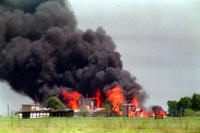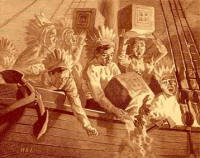In Rejection of Lawlessness
Alexander S. Peak
Also available in .txt and .pdf.
7 May 2008
The Waco Massacre — an act of crime committed by lawless government
I’ve been giving thought to the terminology that we use to describe ourselves.
Most of us call ourselves liberals or conservatives. Some of us call ourselves socialists, or libertarians, or anarchists, or fascists. Some of us merely identify ourselves as moderates. With each of these terms, however, a certain level of ambiguity exists.
Obviously, one often finds difficulty when trying to communicate using such words as “liberal” or “conservative.” Whereas classical liberalism was extremely laissez-faire, modern-day American “liberalism” is quite contrary to this wonderful, traditional liberalism. Indeed, this modern-day variant might be more properly be referred to as democratic socialism. And as for the term “conservative,” it’s gone through so many mutations that it’s virtually impossible to understand what one means when one uses it.
But these aren’t the only terms that constitute anti-concepts. The term “anarchist” also carries with it a great deal of confusion. I have been called by some an anarchist, but what exactly does this mean? And more importantly, should I call myself an “anarchist,” or just reject the term outright?
I think the best approach for me, personally, may be to treat the term in the same way I treat “liberal” and “conservative.” Whenever someone asks me if I’m a liberal, I ask them in what context they are using the term.
So, if and when I’m asked if I’m an anarchist, perhaps this is the response I ought to give:
That all depends upon what you mean, my dear friend.
If, by “anarchy,” you mean chaos and destruction, I am absolutely and without a doubt not an anarchist.
If, however, you mean nothing more than the simple belief that the government ought to never infringe upon any person’s natural, inalienable, negative rights to life, Liberty, and justly-acquired property, then yes, I share in that belief.
The Boston Tea Party — a peaceful act of rebellion against lawless government
I definitely reject lawlessness—wholly and without reservation.
Moreover, unlike liberals and conservatives, I do not believe any government should ever find itself in a state of lawlessness. By that I mean, unlike liberals and conservatives, I do not believe the government is above the law, or deserves any special exceptions. All governments, everywhere, ought to abide by the same basic laws as everyone else.
Whenever a government arrests someone for some victimless “crime,” like smoking a joint or evading taxes, the government is violating that person’s natural rights, and therefore acting in violation of natural law. It is because libertarians so strongly reject lawlessness that we strand in strict opposition to any and all victimless “crime” legislation.
I do not mean here to simply bash liberals and conservatives, of course. Surely, there are those out there reading this who self-identify as liberals or as conservatives, and yet who do not fall within the stereotype I present above. For those liberals and conservatives reading this, and saying to themselves, “I, too, reject victimless crime legislation,” that’s wonderful! Perhaps you, too, are a libertarian.


